Chenghao Deng
EnsemW2S: Enhancing Weak-to-Strong Generalization with Large Language Model Ensembles
May 28, 2025Abstract:With Large Language Models (LLMs) rapidly approaching and potentially surpassing human-level performance, it has become imperative to develop approaches capable of effectively supervising and enhancing these powerful models using smaller, human-level models exposed to only human-level data. We address this critical weak-to-strong (W2S) generalization challenge by proposing a novel method aimed at improving weak experts, by training on the same limited human-level data, enabling them to generalize to complex, super-human-level tasks. Our approach, called \textbf{EnsemW2S}, employs a token-level ensemble strategy that iteratively combines multiple weak experts, systematically addressing the shortcomings identified in preceding iterations. By continuously refining these weak models, we significantly enhance their collective ability to supervise stronger student models. We extensively evaluate the generalization performance of both the ensemble of weak experts and the subsequent strong student model across in-distribution (ID) and out-of-distribution (OOD) datasets. For OOD, we specifically introduce question difficulty as an additional dimension for defining distributional shifts. Our empirical results demonstrate notable improvements, achieving 4\%, and 3.2\% improvements on ID datasets and, upto 6\% and 2.28\% on OOD datasets for experts and student models respectively, underscoring the effectiveness of our proposed method in advancing W2S generalization.
EnsemW2S: Can an Ensemble of LLMs be Leveraged to Obtain a Stronger LLM?
Oct 06, 2024



Abstract:How can we harness the collective capabilities of multiple Large Language Models (LLMs) to create an even more powerful model? This question forms the foundation of our research, where we propose an innovative approach to weak-to-strong (w2s) generalization-a critical problem in AI alignment. Our work introduces an easy-to-hard (e2h) framework for studying the feasibility of w2s generalization, where weak models trained on simpler tasks collaboratively supervise stronger models on more complex tasks. This setup mirrors real-world challenges, where direct human supervision is limited. To achieve this, we develop a novel AdaBoost-inspired ensemble method, demonstrating that an ensemble of weak supervisors can enhance the performance of stronger LLMs across classification and generative tasks on difficult QA datasets. In several cases, our ensemble approach matches the performance of models trained on ground-truth data, establishing a new benchmark for w2s generalization. We observe an improvement of up to 14% over existing baselines and average improvements of 5% and 4% for binary classification and generative tasks, respectively. This research points to a promising direction for enhancing AI through collective supervision, especially in scenarios where labeled data is sparse or insufficient.
Easy2Hard-Bench: Standardized Difficulty Labels for Profiling LLM Performance and Generalization
Sep 27, 2024
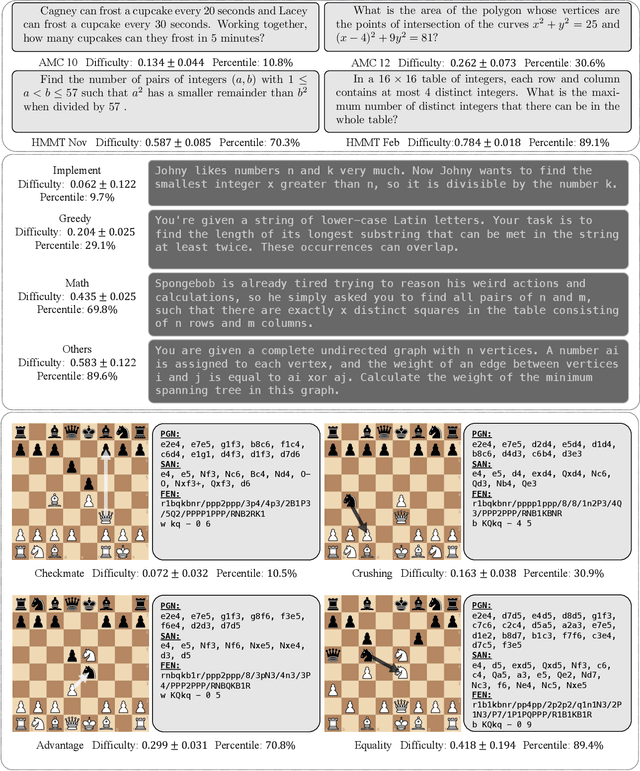
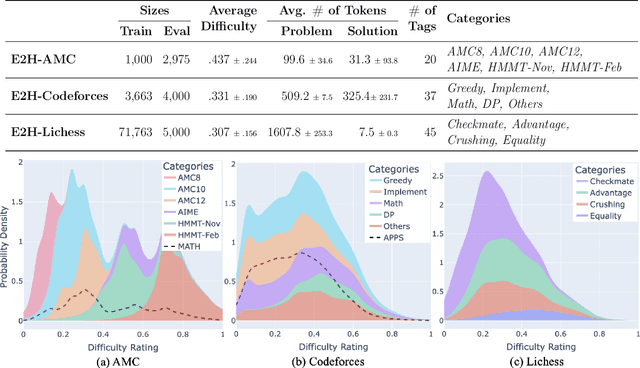
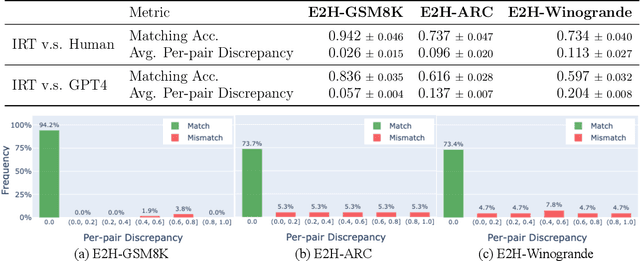
Abstract:While generalization over tasks from easy to hard is crucial to profile language models (LLMs), the datasets with fine-grained difficulty annotations for each problem across a broad range of complexity are still blank. Aiming to address this limitation, we present Easy2Hard-Bench, a consistently formatted collection of 6 benchmark datasets spanning various domains, such as mathematics and programming problems, chess puzzles, and reasoning questions. Each problem within these datasets is annotated with numerical difficulty scores. To systematically estimate problem difficulties, we collect abundant performance data on attempts to each problem by humans in the real world or LLMs on the prominent leaderboard. Leveraging the rich performance data, we apply well-established difficulty ranking systems, such as Item Response Theory (IRT) and Glicko-2 models, to uniformly assign numerical difficulty scores to problems. Moreover, datasets in Easy2Hard-Bench distinguish themselves from previous collections by a higher proportion of challenging problems. Through extensive experiments with six state-of-the-art LLMs, we provide a comprehensive analysis of their performance and generalization capabilities across varying levels of difficulty, with the aim of inspiring future research in LLM generalization. The datasets are available at https://huggingface.co/datasets/furonghuang-lab/Easy2Hard-Bench.
Beyond Worst-case Attacks: Robust RL with Adaptive Defense via Non-dominated Policies
Feb 20, 2024
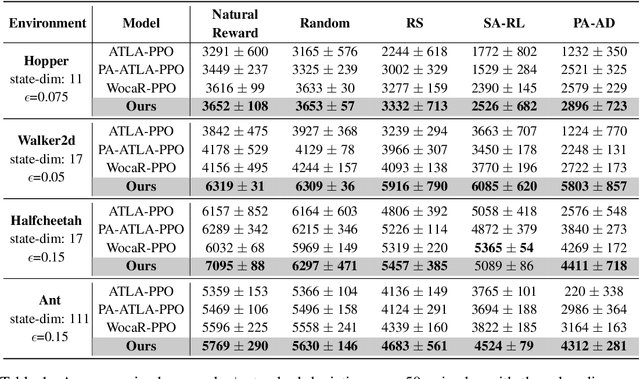
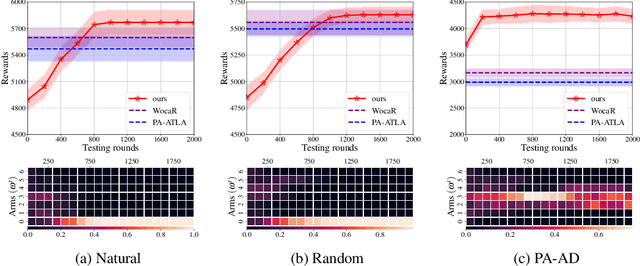
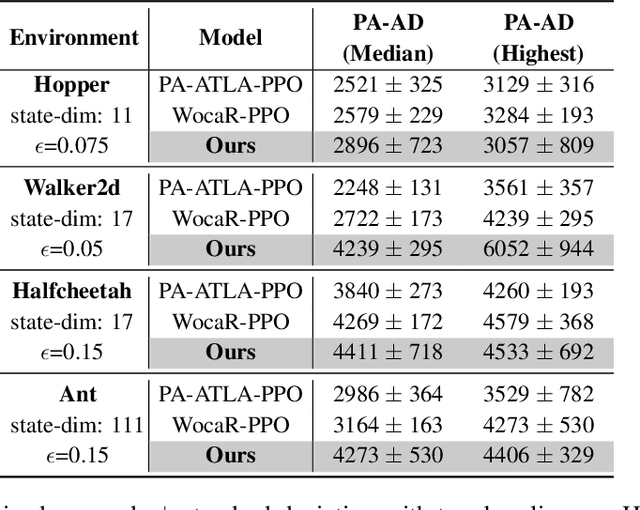
Abstract:In light of the burgeoning success of reinforcement learning (RL) in diverse real-world applications, considerable focus has been directed towards ensuring RL policies are robust to adversarial attacks during test time. Current approaches largely revolve around solving a minimax problem to prepare for potential worst-case scenarios. While effective against strong attacks, these methods often compromise performance in the absence of attacks or the presence of only weak attacks. To address this, we study policy robustness under the well-accepted state-adversarial attack model, extending our focus beyond only worst-case attacks. We first formalize this task at test time as a regret minimization problem and establish its intrinsic hardness in achieving sublinear regret when the baseline policy is from a general continuous policy class, $\Pi$. This finding prompts us to \textit{refine} the baseline policy class $\Pi$ prior to test time, aiming for efficient adaptation within a finite policy class $\Tilde{\Pi}$, which can resort to an adversarial bandit subroutine. In light of the importance of a small, finite $\Tilde{\Pi}$, we propose a novel training-time algorithm to iteratively discover \textit{non-dominated policies}, forming a near-optimal and minimal $\Tilde{\Pi}$, thereby ensuring both robustness and test-time efficiency. Empirical validation on the Mujoco corroborates the superiority of our approach in terms of natural and robust performance, as well as adaptability to various attack scenarios.
Benchmarking the Robustness of Image Watermarks
Jan 22, 2024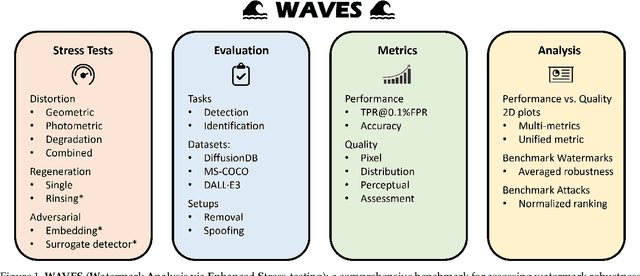
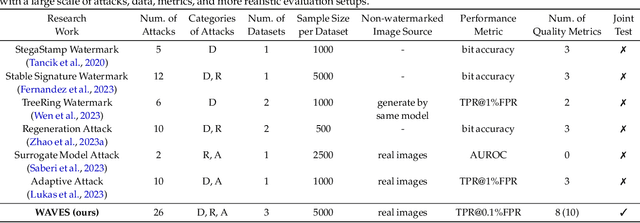

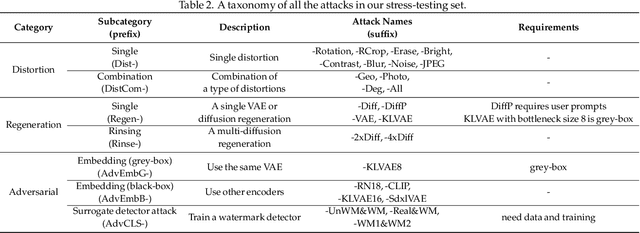
Abstract:This paper investigates the weaknesses of image watermarking techniques. We present WAVES (Watermark Analysis Via Enhanced Stress-testing), a novel benchmark for assessing watermark robustness, overcoming the limitations of current evaluation methods.WAVES integrates detection and identification tasks, and establishes a standardized evaluation protocol comprised of a diverse range of stress tests. The attacks in WAVES range from traditional image distortions to advanced and novel variations of diffusive, and adversarial attacks. Our evaluation examines two pivotal dimensions: the degree of image quality degradation and the efficacy of watermark detection after attacks. We develop a series of Performance vs. Quality 2D plots, varying over several prominent image similarity metrics, which are then aggregated in a heuristically novel manner to paint an overall picture of watermark robustness and attack potency. Our comprehensive evaluation reveals previously undetected vulnerabilities of several modern watermarking algorithms. We envision WAVES as a toolkit for the future development of robust watermarking systems. The project is available at https://wavesbench.github.io/
Equal Long-term Benefit Rate: Adapting Static Fairness Notions to Sequential Decision Making
Sep 07, 2023Abstract:Decisions made by machine learning models may have lasting impacts over time, making long-term fairness a crucial consideration. It has been shown that when ignoring the long-term effect, naively imposing fairness criterion in static settings can actually exacerbate bias over time. To explicitly address biases in sequential decision-making, recent works formulate long-term fairness notions in Markov Decision Process (MDP) framework. They define the long-term bias to be the sum of static bias over each time step. However, we demonstrate that naively summing up the step-wise bias can cause a false sense of fairness since it fails to consider the importance difference of different time steps during transition. In this work, we introduce a long-term fairness notion called Equal Long-term Benefit Rate (ELBERT), which explicitly considers varying temporal importance and adapts static fairness principles to the sequential setting. Moreover, we show that the policy gradient of Long-term Benefit Rate can be analytically reduced to standard policy gradient. This makes standard policy optimization methods applicable for reducing the bias, leading to our proposed bias mitigation method ELBERT-PO. Experiments on three sequential decision making environments show that ELBERT-PO significantly reduces bias and maintains high utility. Code is available at https://github.com/Yuancheng-Xu/ELBERT.
 Add to Chrome
Add to Chrome Add to Firefox
Add to Firefox Add to Edge
Add to Edge